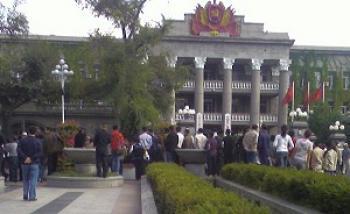Ninety-one year old Yang Genkui lives in Sichuan Province. His right eye is almost blind. He said it was damaged by tear gas from the Japanese army during the Sihang battle. When asked what kind of benefits he has received all these years, Yang said “none.”
Yang once asked for financial help from officials in Jintang County, Chengdu City, Sichuan Province, and was told to “go to Taiwan and ask the Kuomintang [party] for benefits.”
The official was implying that since the battle Yang fought in was between the National Revolutionary Army and the Japanese--predating the Chinese Communist Party (CCP) take-over--Yang was not eligible to receive a pension or medical benefits from the CCP.
The Nationalists, led by Chiang Kai-shek, were ruling China at the time. Later, in 1949, they lost China to the communists and fled to Taiwan where they became a major political party, called Kuomintang.
Yang told the official: “It was for our country [not a particular party] that I fought the Japanese!”
Yang was born in March 1921 into a family of three generations of blacksmiths. He joined the military in February 1936. After winning the war against Japan, he returned home and became a blacksmith again, according to the Yangcheng Evening News.
People in his village knew that he was a nationalist soldier but no one knew that he was one of the heroes of the famous battle of Shanghai.
Last of the ‘800 Warriors’
The Battle of Shanghai was one of China’s most heroic battles to fend off the Japanese during the Sino-Japanese War. The aim of this battle was to delay the Japanese invasion into China. The nationalist soldiers would rather die than surrender, and they completely defeated Japan’s plan to conquer China within three months.
Of the Battle of Shanghai, the most well-known and heroic fight was the safeguarding of the Sihang warehouse.
During the night of Oct. 26, 1937, the 500,000 nationalist soldiers were ordered to withdraw from Shanghai to prepare for a prolonged resistance war, because several vital towns in the area had already been lost.
However, Chiang Kai-shek ordered one battalion of 397 soldiers under the command of Xie Jinyuan to remain behind to defend the strategic Sihang warehouse on the northern bank of the Suzhou Creek, and to give Chinese troops more time to retreat.
Next:The battalion called itself the army of 800 soldiers
In order to confuse and intimidate the Japanese troops, the battalion called itself the army of 800 soldiers. Later, the term “800 soldiers” stuck to describe the 397 brave men, led by Xie Jinyuan, who fought for four consecutive days and repeatedly repulsed the Japanese.
The battle near Sihang warehouse has since been the subject of many movies.
Commander Xie Jinyuan, who was greatly revered by his men, survived the battle. But in 1941 he was assassinated by three Chinese “traitors,” people who proposed reconciliation with Japan because they thought it was impossible for China to win the war against Japan. To honor their commander, the remaining “800 soldiers” had a copper memorial medal made, which they cherished as their identification badge during the war, and later on as a memento of their valiant fight at Shanghai.
In December 2010, the veteran Yang, accompanied by his family, visited the Jianchuan Museum in Chengdu City that had been built to memorialize the war heroes who fought against Japan.
When he came to the exhibition hall of the Battle of Shanghai, Yang interrupted a museum guide who was giving a speech by saying: “I was there to guard the Sihang warehouse.”
He then proceeded to vividly describe to everyone how he fought the Japanese soldiers hand-to-hand during the famous battle 73 years ago, the Yangcheng Evening News said in a report on Dec. 4, 2010.
Yang was later confirmed to be the last of the “800 soldiers” known to be still alive. In January 2011, he donated three honorary copper medals he earned during the war to the permanent collection of Jianchuan Museum.
Victimized During Cultural Revolution
Yang said during the Cultural Revolution he was classified and mistreated as one of the “Black Five Categories:” landlords, rich farmers, anti-revolutionists, bad elements, and Rightists.
To prove that he fought against the Japanese, which were considered an enemy by the CCP, and never during any civil wars, Yang took his Xie Jinyuan memorial medal to a police, hoping to prove his innocence.
The police, however, took his medal away, locked him up and tortured him.
Yang has eight children. They make a living by farming and as migrant workers in other cities. He lives with his youngest son.
Nowadays, Yang’s greatest wish is to find the lost Xie Jinyuan memorial medal confiscated during the Culture Revolution.
Read the original Chinese Version
